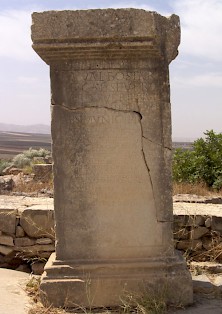Stela of Marcus Valerius Severus
Stela of Marcus Valerius Severus: monument from Volubilis, documenting the annexation of Mauretania by the Romans.

After the Second Punic War, Rome was to become the leading political and military power in Northern Africa. As a consequence, almost the whole coastal strip had already been colonised when the emperor Caligula (r.37-41 CE) came to power. The only exception was the client state Mauretania, which had officially preserved its independency. But even that apparent dependency ceased to exist when Caligula invited the last Mauretanian king, Ptolemy, son of Juba II, to Rome and had him killed.note
As a result, Aedemon, a freedman of the assassinated king, started a revolt against the Roman aggressor. It was Caligula's successor Claudius (r.41-54) who eventually annexated the country in 44, dividing the area into two provinces: Mauretania Tingitana (west) and Mauretania Caesariensis (east).
Volubilis (nowadays: Walili, Morocco) was a major city in Mauretania Tingitana. Near the macellum (market-place) of that Roman ruin city, an interesting stela was found that is related to the events mentioned above. The stela was erected in honour of a certain Marcus Valerius Severus, a local governor, who had assisted the Romans in oppressing the serious revolt. The text reads:
Marco VALerio BOSTARIS Filio GALeria tribu SEVERO
AEDili SUFETI duumVIRo FLAMINI PRIMO IN MUNICIPIO SUO
PRAEFecto AUXILIORum ADVERSUS AEDEMONEM OPPRESSUM BELLO
HUIC ORDO MUNICIPII VOLUBilitani
OB MERITA ERGA REM PUBlicam ET LEGATIONEM BENE GESTAM
QUA AB DIVO CLAUDIO CIVITATEM ROMANAM
ET CONUBIUM CUM PEREGRINIS MULIERIBUS
IMMUNITATEM ANNORum DECEM INCOLAS BONA CIVIUM BELLO
INTERFECTORUM QUORUM HEREDES NON EXTABANT SUIS IMPETRAVIT
FABIA BIRA IZELTAE Filia UXOR INDULGENTISSIMO VIRO HONORE USA
IMPENSAM REMISIT ET De Sua Pecunia Dedit DeDICavitIn honor of Marcus Valerius Severus, son of Bostar, from the Galerian voting district,note aedile,note sufes, duumvir and the first flamen in his municipium, leader of the auxilia [fighting] against Aedemon, who was beaten by the force of war; in honor of that man, the ordo decurionum (city council) of the municipium of Volubilis [had this stela erected], because of his merits for the common interest and [especially] because of his successful embassy to the deceased emperor (divus) Claudius, as a result of which he obtained [the following privileges] for his [people] (suis): the Roman citizenship (civitas) with the right to marry non-Roman wives,note [and] a tax exemption for the period of ten years [and a number of new] inhabitants [and the disposal of] the capital (bona) of those citizens, killed during the war, who didn't leave a heir. Fabia Bira, daughter of Izelta, had [this stela] erected at her own expense, in honor of her beloved husband.
This inscription (ILM 116, IAM 2,448) has been discussed intensively by modern historians until the present day. It seems to be the case that Claudius granted the city the status of municipium as a result of Marcus' successful embassy, which implied that "his [people]" obtained the Roman citizenship (Fishwick). ("His people" meaning either the whole city population or only the auxiliary forces.)
The inscription is a clear testimony of romanisation. Marcus Valerius Severus had a Latin name (tria nomina), so he was already a Roman citizen when the stela was erected (or even before that time). Obviously, he was a native Mauretanian. His father Bostar (meaning: "with Ishtar") had a common Punic name. His wife (Bira) and mother-in-law (Izelta) seem to have carried native "Libyan" names, according to Thouvenot.
Marcus was a proper person to head the embassy because he already had a leading position in his home town. Before the embassy he had the (Punic) function of sufete, later on he obtained the (Roman) function of duumvir, both being equivalent: one of two annually elected majors of the city. Also, Marcus and his wife were given an official function as priest of the imperial cult (flamen and flaminica) in Volubilis.
The conflict between Aedemon and his (pro-)Roman adversaries may have lasted for four years and could rightly be called a regular war (oppressum bello). Consequently, the granting of Roman citizenship to the inhabitants (or auxiliary forces) of Volubilis may be regarded as a reward, whereas the three subsequent measures by Claudius were probably meant to compensate the city for the losses and damages suffered (cf. Pons Pujol on bona vacantia).
It is a telling fact that a number of local rulers (among whom Marcus Valerius Severus) were ready to join forces with the Roman emperor, who had just killed their own legitimate king.
Some literature
- Christol, M. & J. Gascou (1980). "Volubilis, cité fédérée?", in: Mélanges de l' École française de Rome (Antiquité), vol. 92, 329-345.
- Fishwick, D. (1972), "The Institution of the Provincial Cult in Roman Mauretania", in: Historia, 22, 698-711.
- IAM = Euzennat, M & Marion, J. & Gascou, J. De Klisch, Y. (1982): Inscriptions latines du Maroc. (Inscriptions antiques du Maroc, vol. 2.) Paris: Eds. du CNRS.
- ILM = Chateleine, L. (éd.): Inscriptions latines du Maroc (I). Paris, 1942.
- Pons Pujol, L. 1997. "Volubilis i els "bona vacantia". Una sintesi", in: Pyrenae 28: 133-149.
- Thouvenot, R. (1949), Volubilis. Paris: Les Belles Lettres.